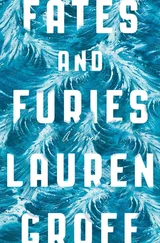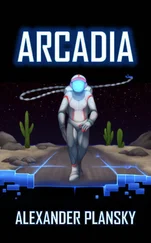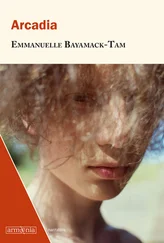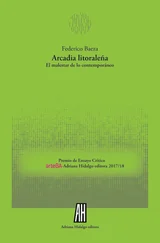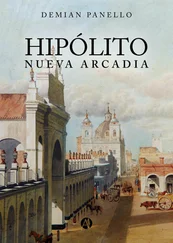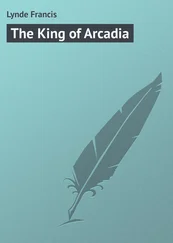Lauren Groff - Arcadia
Здесь есть возможность читать онлайн «Lauren Groff - Arcadia» весь текст электронной книги совершенно бесплатно (целиком полную версию без сокращений). В некоторых случаях можно слушать аудио, скачать через торрент в формате fb2 и присутствует краткое содержание. Год выпуска: 2012, Издательство: Hachette Books, Жанр: Современная проза, на английском языке. Описание произведения, (предисловие) а так же отзывы посетителей доступны на портале библиотеки ЛибКат.
- Название:Arcadia
- Автор:
- Издательство:Hachette Books
- Жанр:
- Год:2012
- ISBN:нет данных
- Рейтинг книги:3 / 5. Голосов: 1
-
Избранное:Добавить в избранное
- Отзывы:
-
Ваша оценка:
- 60
- 1
- 2
- 3
- 4
- 5
Arcadia: краткое содержание, описание и аннотация
Предлагаем к чтению аннотацию, описание, краткое содержание или предисловие (зависит от того, что написал сам автор книги «Arcadia»). Если вы не нашли необходимую информацию о книге — напишите в комментариях, мы постараемся отыскать её.
Arcadia — читать онлайн бесплатно полную книгу (весь текст) целиком
Ниже представлен текст книги, разбитый по страницам. Система сохранения места последней прочитанной страницы, позволяет с удобством читать онлайн бесплатно книгу «Arcadia», без необходимости каждый раз заново искать на чём Вы остановились. Поставьте закладку, и сможете в любой момент перейти на страницу, на которой закончили чтение.
Интервал:
Закладка:
Afterward, the mourners mingle in the downstairs of Arcadia House and someone puts Handy, raspy and young, on the sound system. Hannah is an empty flour sack, heaped on a chair in the corner. Through the music, Bit hears angry whispers about the changes Leif made to the old Homeplace, the downstairs wing of bedrooms now opened into a great hall where cubicles had formed a labyrinth. If the Old Arcadians saw the glossy gutted upstairs, Bit thinks, anarchy would spark again in their tired hearts. Poor Leif; he was one who never minded change. For a moment, Bit’s eyes sting for the eccentric who lost himself in a super-high-altitude balloon three years ago. He stares through a window at the graying sky and imagines Leif still there, frozen and peaceful in the balloon’s cabin, his eyelashes iced, his smile on his blue lips, his body scuttling in the wind at the edge of space.
They come to him, the people he loved when he was a child. But they have gone grotesque. Erik is fatty as a doughnut, spinach stuck in his teeth, an engineer, the sole surviving child of Astrid and Handy because he made boredom his lifeboat. Midge is a bald crone, so tiny that Bit must bend to her: this is the last time she will come here from Florida, she whispers through the green mask she wears against disease. She is too old to suffer the train ride. Tarzan is now entirely crafted of leather, the same suede brown from pate to hands. Simon has a toupee that had lost a corner of adhesiveness in the elements; when he kneels before Hannah, kissing her hands, his hair is like the black lid of a pot canted to check the boil within. Scott and Lisa shine with money. Regina and Ollie are baked by Bermuda sun into the perfect gold of their own cupcakes. Dorotka, blind now, has a rattail braided at the nape of her mullet that her lover tugs affectionately like the leash of a small dog.
The small, thin doctor from the hospital has come, and when she nears, Bit is glad. She is a new person: there is no weight of memory to her. There are cracks in the brown skin around her eyes. She kisses him on the cheek and disappears.
We feel so terrible for you, Little Bit, people whisper.
We loved your father so much, they whisper.
If there is anything we can do, they whisper.
They whisper, whisper, whisper. All whisper, save for D’Angelo, who shouts in his new voice of a Pentecostal reverend, God bless that old skinny bastard, Abe! as tears course down his face, unlined and baby-soft, miraculously unchanged.
Most leave soon. They have work, family, trains to catch. Dylan and Cole and Jincy and their broods are the last to go: they have rented a bus together to save on gas. Only when Bit walks into the humid Green house of the courtyard, which Leif had enclosed entirely in glass a few years back, does he see the Amish. The courtyard is a strange place now, the air heavy and damp. A stream trickles, hidden by the ferns and mosses and overhanging mist. The dark bodies of the Amish have gone vague in the fog; from where Bit stands, they could be Puritans just stepping off the boat into the New World, fearful and awed to have earth beneath their feet again.
He doesn’t want these people here. They are too close to a kind of God he has never been able to believe in, a flesh-eating, stern-browed, whipping-post kind.
One of the bodies separates from the group, comes closer, then clear. When she approaches, her little face is a white saucer, features like berries bunched neatly in the center: blueberry eyes, cherry nose, strawberry mouth. She reaches for Bit’s arm, and he understands, as the woman’s face breaks apart, that she was the one to find his parents in their awful half-success.
She says nothing, just squeezes his bicep again and again. He bears it. He looks up through the vast branches of the oak tree, his old friend. Through the soiled glass above, a black cloud has gathered. The first drops bullet overhead. He can feel, just now, what it’s like for the poor ancient oak, sleeping under glass. No more burn of sun on its leaves. No scour of winter, no smash of storm, no relief when its own dead weight falls away.
Bit goes for a walk to be alone. The rain has stopped, but wet grasses cling to his ankles, leaves shiver rain onto his head. The Sheep’s Meadow is gone, replaced by a low sweep of birch trees pale as girls in the dusk. There’s a feeling of captured movement, a slight tilting down the hill as if in a breath they will regain their human shapes and stumble back into a run. Where the ground lips into the forest, there’s a small opening, Handy’s spot, and Bit can see Handy as he’d been a lifetime ago, cross-legged, hair bound by a strip of Naugahyde, face beatific and froggish.
Bit sits where Handy had sat so often. Instead of grace, however, he feels the damp ground seep into his pants. Well, he says aloud. Let it.
The sky fades from gray to inky blue. The moon, bright arbiter, waits for him.
In one hand, Bit holds his life: his students, faces cracked with interest; the brownstone; the dates with lovely women who keep his attention for a night, a week, a month, until they drift away; the parties, the gallery openings, the brunches with Grete in the park. The civilization of the city. His calm, unruffled life, his books, his friends. In this hand, his sick mother would move to a hospital in the city, where Bit and Grete could visit her every day, bringing flowers, ice chips, news. If there is quarantine, if the disease arrives, he has water tanks, he has food, he has Abe’s gun in the safe in the basement. They could wait it out.
In the other hand, he holds Hannah’s death in Arcadia, the place where his parents were so happy. Where he was so happy as a child. (Or was he? Best to distrust this retrospective radiance: gold dust settles over memory and makes it shine.) In this hand, Bit stays in Arcadia with his mother, cuts the gnarled toenails, washes her skin, remembers her medicines, feels daily the bone-aching worry of it all. He remembers the births he assisted when he was young, brushing the sweaty hair from the women’s foreheads and rubbing their swollen flesh. Here, he would be a midwife to his mother’s decay, Grete beside him, watching it all.
The latter is the heavy hand, the difficult one. It involves action. He has gotten used to sitting quietly aside, to watching. He palpates his anger like the edges of a wound. Does Hannah deserve such care after what she tried to do? What would her decline do to Grete, his daughter of the city, who has barely seen death, only a speckle of flies on the sill, a rat in a trap?
He wishes for a sign, but the night pulls its drawstring tighter and the wind hushes the trees to sleep. Two choices. To float as he has done since he was young. Or to dive in, to swim.
It is night. Funeral pies are on the counter. The four of them sit around the table in the Green house. Bit tries to take his mother’s bad hand, which shocks him with its lightness and coolness, but she snatches it from him with her good one. In the low glow of the kitchen chandelier, his mother’s face looks carved from soap.
Astrid waits beyond the point of comfort to speak. Ever majestic, she is now blinding in her authority. The midwives whom Bit knows in the city speak of her with reverence; it wouldn’t surprise him if somewhere in the world there were shrines with her picture, the way Arcadia had been stippled with colorful altars to Gandhi, Marx, the Dalai Lama. Astrid had her bad teeth pulled in her fifties, and the dentures finish her face the way woodwork finishes a room. She wears long, loose clothes in earth tones that she manages to make elegant. Helle would have been like her mother, if his wife had chosen to share her old age with Bit. But when Grete sits beside her mormor, leaning against her warmth, he sees how his daughter is a second Astrid, leavened with Hannah’s honey. It brushes him, the good feeling that he is sitting in a fold of time.
Читать дальшеИнтервал:
Закладка:
Похожие книги на «Arcadia»
Представляем Вашему вниманию похожие книги на «Arcadia» списком для выбора. Мы отобрали схожую по названию и смыслу литературу в надежде предоставить читателям больше вариантов отыскать новые, интересные, ещё непрочитанные произведения.
Обсуждение, отзывы о книге «Arcadia» и просто собственные мнения читателей. Оставьте ваши комментарии, напишите, что Вы думаете о произведении, его смысле или главных героях. Укажите что конкретно понравилось, а что нет, и почему Вы так считаете.
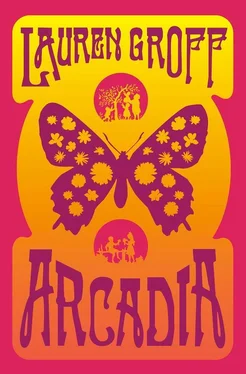
![Andrea Höst - In Arcadia [Touchstone - Extras]](/books/56405/andrea-host-in-arcadia-touchstone-extras-thumb.webp)

